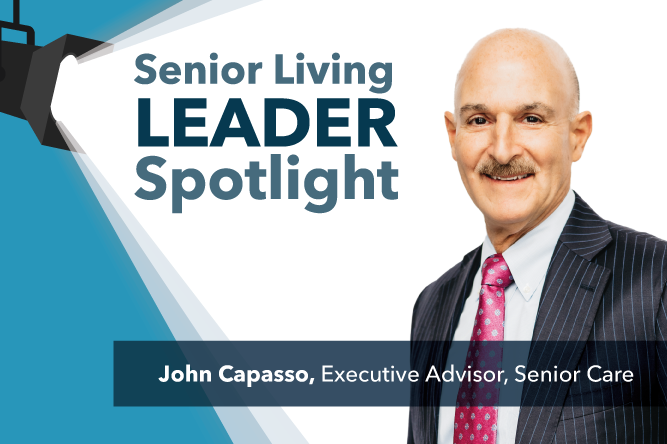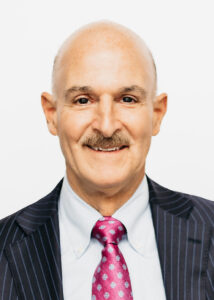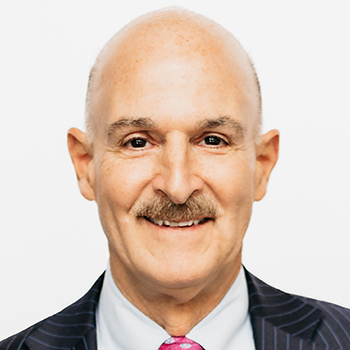
As a former executive of a not-for-profit Catholic health system where he oversaw the Continuing Care Division, John Capasso has extensive experience working with hospitals and health systems, PACE organizations, and senior living and care clients, with an emphasis on supporting faith-based organizations, providers, and sponsors.
John assists organizations with:
- Leadership and strategic planning
- New product development and innovation
- Mergers, acquisitions, and turnarounds
- PACE feasibility, development, and implementation
- Post-acute and acute care integration
- Health system and hospital post-acute strategy development
- Operational performance improvement
Get to Know John
In this senior living leader spotlight series interview, John gives insight into the biggest challenges facing the senior living and care industry, one way that providers can overcome operational and financial hurdles, and how he found his love for senior care.
Q: What do you see as the biggest challenge that senior care and living leaders will face in the next year?
A: The slowdown in home sales due to higher interest rates may result in a decline in new residents entering senior living communities. Resident prospects interested in moving into a life plan community usually rely on the sale of their home to fund entry fees. The slowdown of home sales in certain markets may reduce the number of new residents entering life plan communities, decreasing life plan community occupancies overall.
Q: What advice would you give to hospitals and health systems struggling with discharging their patients to post-acute settings?
A: Communication and collaboration between hospitals and post-acute providers will help address their challenges. Most hospital leaders don’t understand nursing home operations, and most nursing home leaders don’t understand hospital operations. Open dialogue and identifying ways that these two very different organizations can help each other can result in significant win-wins for each organization and, ultimately, better care for the patient.
Q: Where can you be found on your days off?
A: I like to work out every day, so I can be found on a tennis court, in the fitness center, or playing pickleball. If it’s winter, you may find me on a ski slope.
Q: If you could change one thing about the senior living and care industry, what would it be and why?
A: I would like to change the reputation of nursing homes and assisted living communities to eliminate the negative connotation that surrounds them. As the proportion of the population over the age of sixty-five continues to grow, many older adults will need these services. Unfortunately, in many instances, moves to these communities are delayed because of the negative connotations. As an industry, we must do a much better job of providing person-centered care to change our reputation. More rapid movement toward a social model of care versus a medical model of care is a step in the right direction.
Q: What tips do you have for providers who are struggling to understand their market?
A: Complete a deep dive into your market. We tend to find many providers are not aware of their market demographics, occupancies, pricing, or overall competitiveness of other providers. Older data is dated and should be updated every couple of years. Things change and your market area definition likely changes too. The most successful providers are the ones on top of their market and are able to adapt to the needed changes by having the knowledge to help them get there.
Q: Dogs or cats?
A: Dogs!!
Q: Can you share any tips for providers who are struggling with operational and financial challenges?
A: One tip I would share with providers who are struggling with operational and financial challenges is to openly share their challenges with the staff and engage them with problem solving. I suggest monthly meetings with the staff during which financial statements are shared and other challenges are presented and discussed. I’ve found while in leadership roles that staff would rather know the extent of the problem and help with the resolution than not be fully aware of the challenges. Staff are often able to identify potential solutions that leaders may not have thought of.
Q: When did you know you wanted to work with seniors?
A: I began my career as a cardiopulmonary technologist working in cardiac catheterization labs and in cardiovascular surgery suites. Most of our patients were seniors. My colleagues and I were responsible for keeping these patients at ease with the procedures they were about to undergo. So, we greeted them when they arrived in the procedures room, encouraged them through procedures, while they were awake, and cared for them in the recovery room. I really enjoyed hearing about their life experiences and perspectives through these brief relationships. When I moved from acute care to senior living, the relationships that I had with the residents were long-term versus the very short-term relationships I built with acute care patients.
Q: What has been your greatest accomplishment in your career?
A: The greatest accomplishments I’ve enjoyed during my career have been mentoring colleagues to advance their careers and watching them succeed. Over the years, I’ve had the pleasure of coaching and counseling colleagues who eventually rose to leadership positions with higher levels of responsibility and authority. Sometimes those opportunities were achieved within the existing organization, or sometimes they moved on to leadership roles in other organizations. Either way, I was really gratified that I was able to play a role in their advancement.
Q: What is your favorite of HDG’s values and why?
A: I really enjoy the core value of hospitality. I enjoy meeting new HDG colleagues and clients and building relationships. Recently, I’ve been working on a project with a group of clients who were very nervous about HDG’s engagement. I’ve been really gratified after working with these clients that they’ve expressed a great deal of comfort with HDG through the building of these relationships. Hospitality centers around trust. Hospitality and trust go hand in hand.
How John and HDG Can Help You
 John Capasso and the rest of the Health Dimensions Group team can support you through a variety of consulting services, including strategic planning, post-acute and acute care integration, health system and hospital post-acute strategy development, operational performance improvement, as well as PACE feasibility, development, and implementation. With decades of experience as senior living and care community operators and consultants, our team can help you evaluate strategic options, improve performance, and consider growth. Contact us at info@hdgi1.com or 763.537.5700 to learn how our team can help your organization achieve success.
John Capasso and the rest of the Health Dimensions Group team can support you through a variety of consulting services, including strategic planning, post-acute and acute care integration, health system and hospital post-acute strategy development, operational performance improvement, as well as PACE feasibility, development, and implementation. With decades of experience as senior living and care community operators and consultants, our team can help you evaluate strategic options, improve performance, and consider growth. Contact us at info@hdgi1.com or 763.537.5700 to learn how our team can help your organization achieve success.









